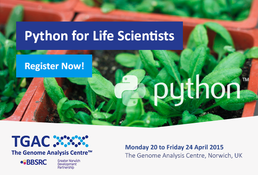Workshop 20th April 2015 9 a.m. The Genome Analysis Centre, Norwich, UK
Python for Life Scientists
- Web page
- http://www.tgac.ac.uk/361_Division/training-programme/courses-workshops/tgac-events/python-for-life-scientists-2/
- Categories
- Bioinformatics, Biomedical, Data Management, Database, Medicine, NextGen Sequencing, Python
- Submitter
- Elena Vataga
Python for Life Scientists
Monday 20 to Friday 24 April 2015
What is this course about?
Python is an object-oriented programming (OPP) language that is ideal for biological data analysis. Starting with basic skills in Unix/Linux, the course will explore language concepts and instructions. This covers the main aspects of OPP, including variables, types, modules, functions, exceptions, control of flux, input, output, and classes.
All the course’s examples and practical sessions will focus on solving the following biological problems:
- Working with DNA and protein sequences
- Data retrieval from files and their manipulation
- Running applications, such as BLAST, locally and from a script
- Finding motifs in sequences
- Parsing Swiss-Prot files, PDB files, ENSEMBL records, blast output files, etc
- Biopython will be also be introduced and applied to some of the above examples
As a highly interactive course, the students will be putting theory into practice while learning. The course will provide a thorough understanding of Python basics, acquiring the skills to manage any type of bioinformatics record and run applications from scripts.
Pre-requisites
Students are required to have a basic familiarity with bioinformatics data resources, such as Uniprot/Swiss-Prot, Blast, ENSEMBL, PDB, etc. The course is targeted at biologists with little or no programming experience with the aim to make them proficient in Python, by managing and analysing biological data on an autonomous level.
Target Audience
Life Scientists who are end-users of bioinformatics databases and tools that aim to develop hands-on capabilities for biological data analysis, for example, writing their own or adapting Python scripts independently.
Application deadline: 6 March 2015
If this course isn't suitable for you, but you know someone who may benefit from this training, please do forward it along!
